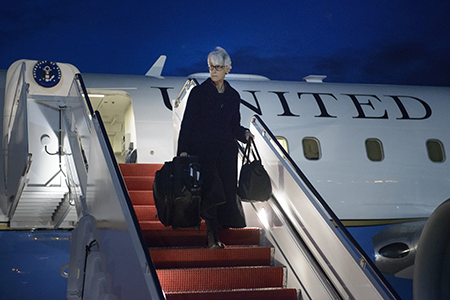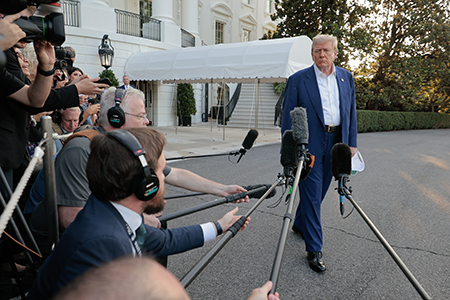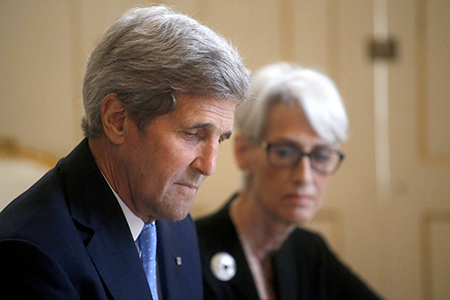"[Arms Control Today] has become indispensable! I think it is the combination of the critical period we are in and the quality of the product. I found myself reading the May issue from cover to cover."
What Happens Now With Iran? An Interview With Wendy Sherman, Chief U.S. Negotiator for the 2015 Iran Nuclear Deal
July/August 2025

For years, U.S. policy aimed at preventing Iran from producing a nuclear weapon has zig-zagged between threats of force, sanctions, diplomacy, and now the use of force. In 2015, President Barack Obama concluded a deal that put strict controls on Iran’s activities, called the Joint Comprehensive Plan of Action. But his successor, Donald Trump, abandoned the agreement in 2018, promising a better one, which never materialized. Since returning to the White House in January, Trump reimposed his “maximum pressure” campaign of sanctions on Iran, dabbled in slow-going indirect negotiations with Iran conducted through the government of Oman, then switched course in June by joining Israel in launching military strikes that pummeled Iranian nuclear facilities. U.S. and Israeli officials have provided no evidence of Iran’s weaponization. As the region’s tectonic plates shift, what happens next depends on choices made by Israel, whose power is rising, and Iran, whose power is weakening, as well as the roles played by the United States and other key countries. Carol Giacomo, editor of Arms Control Today, interviewed former U.S. Deputy Secretary of State Wendy Sherman, the chief U.S. negotiator for the 2015 nuclear deal when she was undersecretary of state for political affairs, for her insights.
Arms Control Today: The Iranians said July 2 they are halting cooperation with the International Atomic Energy Agency (IAEA), whose inspection teams have been on the ground in Iran to ensure the country is not producing nuclear weapons. How much of a problem is that?
Former U.S. Deputy Secretary of State Wendy Sherman: I fully expected that to happen because Iran is a country based on resistance and thus had to say to the world, “now that you’ve bombed us, we make our own decisions. We’re not going to allow people to have eyes on what we do,” even knowing that there are other ways for people to have eyes on what they do, even if less comprehensive. Negotiations matter a great deal now to get the IAEA back into Iran. That is crucial because otherwise, we will have less knowledge about what’s happening in Iran. You cannot bomb away knowledge. I fully expect that some, if not all, of the 400 kilograms of enriched uranium at 60 percent and some centrifuges—probably advanced centrifuges—have been hidden away somewhere, maybe in the bowels of Isfahan; the deep underground at Isfahan was not bombed. Or it is possible that there is an unknown site.
My added worry now is that the Islamic Revolutionary Guard Corps and the Quds Force and other “hard hardliners” will decide that they have to go for a nuclear weapon because they see it as the only real deterrent. And if Iran decides to go for a nuclear weapon, Saudi Arabia will decide it needs a nuclear weapon. South Korea will argue it should be able to have a nuclear weapon. Japan may argue it needs a nuclear weapon. Other countries may as well, and then we are in a terrible place.
The nuclear Nonproliferation Treaty (NPT) has done a pretty good job of keeping the number of nuclear weapons states small and it is crucial for that to continue to be the case. So, I hope the [U.S. President Donald Trump] administration does engage in negotiations with Iran. It doesn’t surprise me that Iran booted the IAEA. It doesn’t surprise me that they’re not ready to negotiate as we speak. But [Iranian Foreign Minister Abbas] Araghchi said the other day, “our door is never closed to negotiations.” So, to me, that’s a signal it can happen. The Trump administration just has to decide it wants to do the very hard work of diplomacy. So far, that has not been the case. That’s been clear with Ukraine, that’s been clear with Gaza, and that’s been clear with Iran. That’s been clear in their tariff deals. There are no “90 deals in 90 days,” no Iran deal in 60 days, no deal in two weeks with [Russian President Vladimir] Putin. It’s ridiculous. Diplomacy takes time, hard work.
ACT: Does the Trump administration have a strategy for dealing with Iran?

Sherman: As this interview goes to press, Israeli Prime Minister Netanyahu is meeting with President Trump, members of the cabinet, and with members of Congress. Steve Witkoff [the U.S. special envoy] is ostensibly slated to travel to Doha yet this week to help try to finalize a Gaza ceasefire and return of hostages. Trump has said a deal could happen this week and although we all hope for that, we have been here before. Even as the administration says the deal is 80-90 percent there, the last percentage points are always the hardest.
Looking at a broader view, rumors and suggestions have been circulated by the administration that combine a broadening of the Abraham Accords; an Arab coalition to support Gaza during reconstruction and reform of the Palestinian Authority; along with recognition of Syria; a new Lebanon; and clearly a diminished Hezbollah, Hamas, and an Iran that must rebuild and negotiate. We will see this week if there remains significant daylight between Trump and Netanyahu on all of these possibilities along with the necessity for a political horizon for Palestinians to ensure a future for Palestinians as well as long-term security for Israel.
ACT: Iran has said it needs assurances that its nuclear scientists, nuclear sites, and nuclear program will be secure and that the international community will acknowledge its right to enrich uranium. Do you think Iran could ever be confident that Israel or the United States would not bomb it again?
Sherman: It would be very hard for Iran to have that kind of confidence, given what occurred. However, they also know that Trump does make deals. And this is about making a deal, not withdrawing from a deal. Maybe the Iranians can be convinced that if Trump makes a deal with them, that in and of itself gives them some security that the deal will last. So, that’s possible. It’s sort of the counterintuitive argument, when someone is the kind of leader that Donald Trump is. However, Trump has called for complete dismantlement of the nuclear program and Iran has always insisted that it has the right to enrich for civil, peaceful purposes.
ACT: Do you think the Europeans who were part of the 2015 nuclear deal—France, Germany, and the United Kingdom, or EU3—are going to reimpose the UN snapback sanctions that were part of the deal? Should they?
Sherman: I don’t know. Now that the IAEA has, in essence, been kicked out of Iran, it puts the EU3 in a much tougher position, increasing the chances of snapback. Now, you know that it’s a process that has to start before the end of October, so I think the next period of time matters tremendously in terms of the trajectory with Iran. If the Trump administration can engage in actual negotiations, if the Europeans do, if the relationship between Iran and Saudi Arabia deepens in any way, which I would be surprised about, whether any negotiations could get the IAEA back in—I mean, if there’s progress over the next couple of months, then the Europeans might hold off.
ACT: There have been a lot of mixed messages about the damage that was done with those military strikes by the United States and Israel. Trump insists the Iranian program was obliterated. IAEA Director-General Rafael Mariano Grossi said a few months. The Pentagon said the program was set back by one or two years. Trump told NATO, “I don’t see Iran being back in the nuclear business anymore.” What is the effect of these mixed messages? Where do you really think things stand?
Sherman: I’m not a nuclear scientist, but the ones that I’ve spoken with think it’s months to a year. But it really depends on where that uranium stockpile is. It depends on where the centrifuges are. It depends on whether the Iranians would decide to go for, in essence, a dirty bomb as opposed to a weaponized, fully loaded bomb on a missile—a very sophisticated weapon. So, there are a lot of unknowns. I absolutely don’t question that there was severe damage done to the Iranian nuclear sites that were attacked. The Iranians have said things were badly damaged. I do not believe the program was “obliterated.” Could it be a year or two? Perhaps. Could be months, even shorter than that? It really depends on where that stockpile is, where the centrifuges are, and what they choose to do or not do. If the [Iranian] Supreme Leader [Ayatollah Ali Khamenei] still doesn’t decide to go for a nuclear weapon but wants to reinstate the program, make sure it can move forward so he still has that option, and he sees what the world is going to do, he might do that. So, I think there are a lot of unknowns.
ACT: When you and others talk about assessing the damage, though, doesn’t it depend on exactly what you’re talking about? Does it mean, has it set back achieving the maximum amount of enriched uranium that you need? Does it mean the converting enriched uranium to the metalized version?
Sherman: Right, and do you have the launch vehicle if you want to go for the real package? So yes, it very much depends on what part of this process is being discussed. But the fact is, the Iranians have mastered the entire nuclear fuel cycle. Recreating that is not hard for them. Yes, it does appear that in terms of the metallurgy conversion facility, that was really hit hard, but that doesn’t mean the Iranians can’t make a nuclear weapon. They still can.
ACT: Do you really think Trump wants negotiations or do you think he is convinced that the United States and Israel hit Iran so hard that it will now be quiescent?
Sherman: I can’t imagine his mind. But I think he’d like to tie that bow and reach a deal so he can say, “I went to do what needed to be done and it’s done.” I think he wants to focus on doing the Gaza Abraham Accord deal and tying that bow. I think it is appalling that the Trump administration has not let the weapons go forward to Ukraine and has posed no new sanctions on Russia, although this week the president appears to be allowing weapons to go forward; whether he will sustain support remains to be seen. Trump has been totally played by Putin. I also think it’s extraordinary how little contact there has been with China; he’s talked to [President] Xi [Jinping] once. But no real diplomacy appears to be going on with Beijing beyond some lower-level trade talks. The president appears to be using tariffs with Asian countries to try to constrain China’s relationship with those countries. Instead, it appears we are alienating our allies.
ACT: You said that maybe Iran would trust a deal with the United States again because it would be Trump making the deal this time and his Republican Party controls Congress. But is there something concrete that the administration is going to have do for Iran to show its bona fides, given that it was Trump who abandoned the nuclear deal in 2018?

Sherman: No, the biggest problem remains what has always been the problem and the only reason [former President Barack] Obama could get a deal. And that is, Iran believes that the NPT gives a country the right to enrich uranium for a civil nuclear program. Most of our European colleagues also believe the NPT gives a country that right. The United States has never, and still does not believe, that a country has the right. What Obama did, and how he opened the door to a deal, was to say he would consider permitting Iran to have a small civil nuclear program to enrich uranium under intrusive monitoring and verification.
Trump, because of pressure from Republican senators, the prime minister of Israel, and from a lot of his donors, has said there must be a complete dismantlement of the program. That is why Trump said he obliterated the Iranian nuclear program with the recent airstrikes because no other standard is consistent with what he has said. There must be a complete dismantlement of the program, so he has to say, “It’s been obliterated, I’m done with that.” Whether people will understand he still has to negotiate to make sure we have eyes on what’s happening in Iran, I don’t know.
ACT: What do you think the end result would have to be, or could be? Total disarmament or containment?
Sherman: I would be very surprised if Iran would agree to a total dismantlement. My understanding is the Trump administration proposed a deal where Iran would be allowed to enrich a small amount of uranium for a period of time until a consortium was formed where the enriched fuel would be created somewhere else and be available to Iran for its civil nuclear program, and the Iranians said, “No, we have a right to enrich.”
Whether the president allowed Witkoff to also put on the table all that was available as incentives, I don’t know. Obama could never put the primary economic embargo [that the United States imposed on Iran] on the negotiating table. We could offer a carve-out for Boeing and plane parts, but we couldn’t put the whole thing on the table in part, because Iran didn’t want Americans inside of Iran and politics at the time made such an agreement impossible. Ostensibly, Iran, in talks with Witkoff, said it was open to Americans being in Iran. There are, besides the primary embargo, other potential incentives the Trump administration might be able to offer that the Obama administration couldn’t because the House and the Senate belong to Trump.
ACT: You, along with other U.S. officials, spent a lot of time negotiating the 2015 nuclear deal, Trump tore it up and 10 years later, the United States and Israel end up bombing Iran—the outcome you tried to prevent. How does that make you feel?
Sherman: Few things are done-done in life. When I talk about this, I say to students, World War I was called “the war to end all wars.” Twenty years later, which is not much time in history, we had World War II. Permanent solutions are rare, if ever. So, we have to persist, we have to persist!
